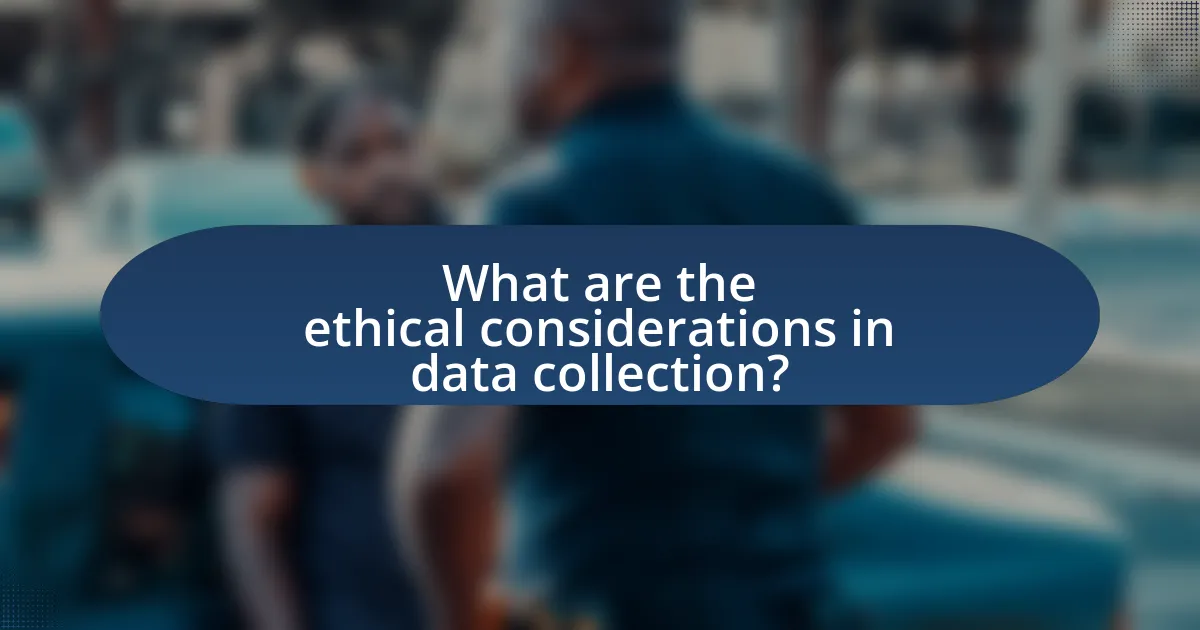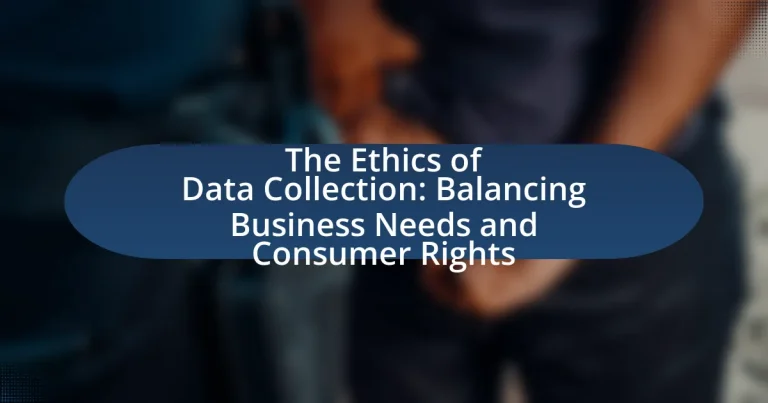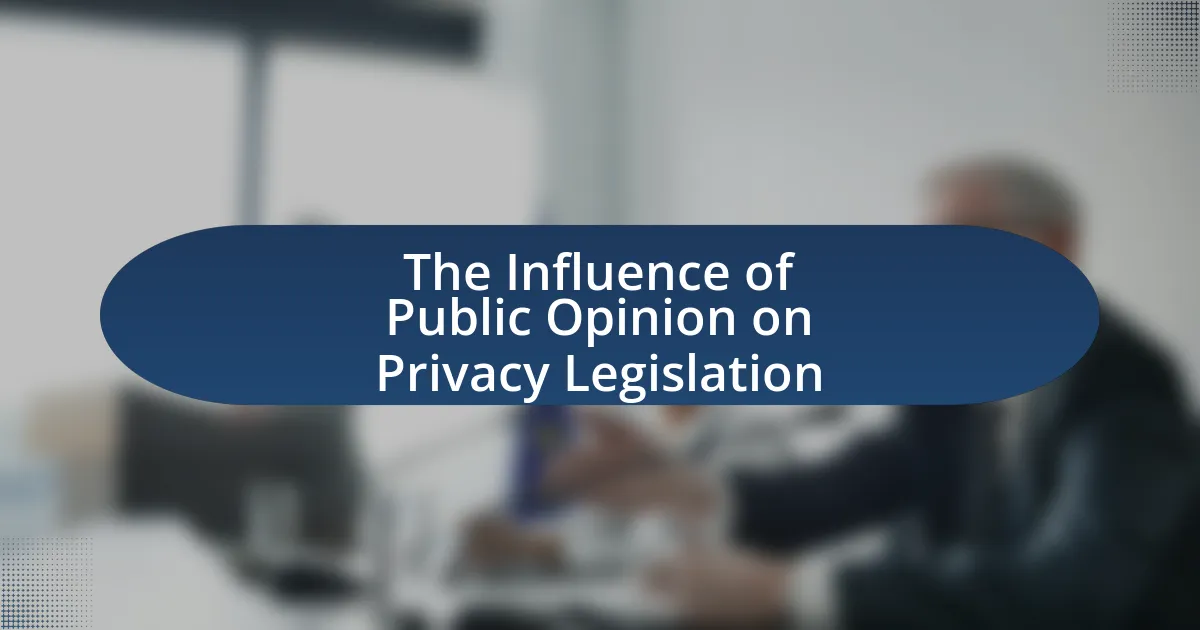The article focuses on the ethics of data collection, emphasizing the need to balance business interests with consumer rights. It outlines key ethical considerations such as informed consent, data privacy, and the potential for harm, supported by regulations like the General Data Protection Regulation (GDPR). The importance of ethical data practices for businesses is highlighted, showcasing how they foster consumer trust and loyalty while mitigating legal risks. Additionally, the article discusses consumer rights regarding data, the challenges businesses face in ethical data collection, and best practices for compliance and transparency. It also addresses the role of consumer awareness and technological advancements in shaping data ethics.

What are the ethical considerations in data collection?
Ethical considerations in data collection include informed consent, data privacy, and the potential for harm. Informed consent requires that individuals understand what data is being collected and how it will be used, ensuring transparency and respect for autonomy. Data privacy involves safeguarding personal information from unauthorized access and misuse, which is critical in maintaining trust between organizations and individuals. The potential for harm refers to the risks associated with data breaches or misuse of data, which can lead to discrimination or exploitation. These considerations are supported by regulations such as the General Data Protection Regulation (GDPR), which emphasizes the importance of ethical practices in data handling.
Why is ethical data collection important for businesses?
Ethical data collection is important for businesses because it fosters trust and loyalty among consumers. When businesses collect data transparently and responsibly, they enhance their reputation and reduce the risk of legal repercussions. For instance, a study by the Pew Research Center found that 79% of Americans are concerned about how their data is being used, indicating that ethical practices can significantly influence consumer behavior. Additionally, adhering to ethical standards helps businesses comply with regulations such as the General Data Protection Regulation (GDPR), which imposes strict guidelines on data handling. This compliance not only avoids hefty fines but also positions businesses as responsible entities in the eyes of consumers.
How does ethical data collection impact consumer trust?
Ethical data collection significantly enhances consumer trust by demonstrating a commitment to transparency and respect for privacy. When businesses collect data ethically, they inform consumers about what data is being collected, how it will be used, and obtain consent, which fosters a sense of security. According to a 2021 survey by the Pew Research Center, 79% of consumers expressed concern about how their data is being used, indicating that ethical practices can alleviate these concerns and build trust. Furthermore, companies that prioritize ethical data practices often experience increased customer loyalty and positive brand perception, as consumers are more likely to engage with brands they trust.
What are the potential consequences of unethical data practices?
Unethical data practices can lead to severe consequences, including legal penalties, loss of consumer trust, and reputational damage. For instance, companies that violate data protection regulations, such as the General Data Protection Regulation (GDPR), may face fines up to 4% of their annual global revenue. Additionally, unethical practices can result in consumers withdrawing their consent for data usage, leading to decreased customer loyalty and potential financial losses. Research by the Ponemon Institute indicates that 70% of consumers would stop doing business with a company after a data breach, highlighting the critical impact of unethical data handling on business sustainability.
What rights do consumers have regarding their data?
Consumers have specific rights regarding their data, including the right to access, correct, delete, and restrict the processing of their personal information. These rights are often enshrined in data protection laws such as the General Data Protection Regulation (GDPR) in the European Union, which mandates that consumers can request access to their data, receive information on how it is used, and demand its deletion under certain circumstances. Additionally, consumers have the right to object to data processing and to data portability, allowing them to transfer their data between service providers. These rights are designed to empower consumers and ensure their control over personal information in an increasingly data-driven world.
How can consumers exercise their rights in data collection?
Consumers can exercise their rights in data collection by actively requesting access to their personal data, opting out of data collection, and filing complaints with regulatory bodies. These actions are supported by laws such as the General Data Protection Regulation (GDPR) in the European Union, which grants individuals the right to know what data is collected, how it is used, and the ability to withdraw consent at any time. Additionally, consumers can utilize tools and settings provided by companies to manage their privacy preferences, ensuring they have control over their information.
What regulations protect consumer data rights?
Regulations that protect consumer data rights include the General Data Protection Regulation (GDPR) in the European Union, the California Consumer Privacy Act (CCPA) in the United States, and the Health Insurance Portability and Accountability Act (HIPAA) for health information. The GDPR establishes strict guidelines for data collection, processing, and storage, granting consumers rights such as access to their data and the right to be forgotten. The CCPA enhances privacy rights for California residents, allowing them to know what personal data is collected and to whom it is sold. HIPAA safeguards sensitive health information, ensuring that individuals’ medical records are kept confidential. These regulations collectively aim to empower consumers and hold businesses accountable for data protection.
How can businesses balance their needs with consumer rights?
Businesses can balance their needs with consumer rights by implementing transparent data collection practices that prioritize consumer consent and privacy. This approach not only fosters trust but also aligns with regulations such as the General Data Protection Regulation (GDPR), which mandates that businesses obtain explicit consent from consumers before collecting their data. By adopting privacy-by-design principles, companies can ensure that consumer rights are respected while still achieving their business objectives, such as targeted marketing and improved customer experiences. Research indicates that 88% of consumers are more likely to trust companies that are transparent about how their data is used, demonstrating that ethical data practices can enhance brand loyalty and drive revenue.
What strategies can businesses implement for ethical data collection?
Businesses can implement several strategies for ethical data collection, including obtaining informed consent, ensuring data minimization, and maintaining transparency. Informed consent requires businesses to clearly communicate what data is being collected, how it will be used, and obtaining explicit permission from consumers. Data minimization involves collecting only the data necessary for specific purposes, reducing the risk of misuse. Transparency entails openly sharing data practices with consumers, fostering trust and accountability. According to a 2020 study by the International Association of Privacy Professionals, 79% of consumers are more likely to engage with companies that are transparent about their data practices, highlighting the importance of these strategies in building consumer trust.
How can transparency enhance the balance between business needs and consumer rights?
Transparency enhances the balance between business needs and consumer rights by fostering trust and accountability. When businesses openly share their data collection practices, consumers are better informed about how their information is used, which empowers them to make educated choices. For instance, a study by the Pew Research Center found that 79% of consumers are concerned about how their data is used, indicating a strong demand for transparency. This openness not only helps businesses align their practices with consumer expectations but also mitigates the risk of regulatory penalties, as compliance with data protection laws often hinges on transparent practices. Thus, transparency serves as a crucial mechanism for harmonizing the interests of both parties.
What challenges do businesses face in ethical data collection?
Businesses face significant challenges in ethical data collection, primarily related to privacy concerns, regulatory compliance, and consumer trust. Privacy concerns arise as consumers increasingly demand transparency about how their data is used, leading to potential backlash if businesses fail to communicate effectively. Regulatory compliance is another challenge, as laws such as the General Data Protection Regulation (GDPR) impose strict guidelines on data handling, requiring businesses to invest in legal expertise and compliance measures. Additionally, maintaining consumer trust is critical; breaches or unethical practices can result in reputational damage and loss of customer loyalty. According to a 2021 survey by the International Association of Privacy Professionals, 70% of consumers expressed concern about how their data is collected and used, highlighting the importance of addressing these challenges for sustainable business practices.
How do technological advancements complicate data ethics?
Technological advancements complicate data ethics by enabling extensive data collection and analysis, often without adequate consent or transparency. For instance, the rise of artificial intelligence and machine learning allows companies to process vast amounts of personal data, leading to potential misuse and privacy violations. A study by the Pew Research Center in 2021 found that 81% of Americans feel they have little to no control over the data collected about them, highlighting the ethical dilemma of balancing business interests with consumer rights. This situation is exacerbated by the rapid pace of innovation, which outstrips existing regulatory frameworks, making it challenging to ensure ethical standards are upheld.
What role does consumer awareness play in data ethics?
Consumer awareness plays a crucial role in data ethics by empowering individuals to understand their rights and the implications of data collection practices. When consumers are informed about how their data is collected, used, and shared, they can make better decisions regarding their privacy and consent. Research indicates that higher levels of consumer awareness lead to increased demand for transparency and ethical practices from companies, which in turn encourages businesses to adopt more responsible data handling policies. For instance, a study by the Pew Research Center found that 79% of Americans are concerned about how their data is being used by companies, highlighting the importance of consumer awareness in driving ethical standards in data practices.
What best practices should businesses follow for ethical data collection?
Businesses should prioritize transparency, consent, and data minimization as best practices for ethical data collection. Transparency involves clearly informing consumers about what data is being collected, how it will be used, and who it will be shared with. Consent requires obtaining explicit permission from individuals before collecting their data, ensuring they understand their rights. Data minimization means only collecting data that is necessary for the intended purpose, thereby reducing the risk of misuse. According to a 2020 study by the International Association of Privacy Professionals, 79% of consumers are more likely to trust companies that are transparent about their data practices, highlighting the importance of these best practices in fostering consumer trust and compliance with regulations like GDPR.
How can businesses ensure compliance with data protection laws?
Businesses can ensure compliance with data protection laws by implementing robust data governance frameworks that include regular audits, employee training, and clear data handling policies. These frameworks should align with regulations such as the General Data Protection Regulation (GDPR) and the California Consumer Privacy Act (CCPA), which mandate specific practices for data collection, storage, and processing. For instance, organizations must obtain explicit consent from individuals before collecting personal data and provide transparent information about how that data will be used. Additionally, businesses should conduct impact assessments to identify and mitigate risks associated with data processing activities, ensuring that they uphold consumer rights and maintain accountability.
What tools can assist in maintaining ethical data practices?
Tools that can assist in maintaining ethical data practices include data governance platforms, privacy management software, and consent management tools. Data governance platforms, such as Collibra and Alation, help organizations establish policies and procedures for data usage, ensuring compliance with regulations like GDPR. Privacy management software, like OneTrust and TrustArc, enables businesses to assess and manage privacy risks effectively, facilitating transparency and accountability in data handling. Consent management tools, such as Cookiebot and ConsentManager, allow organizations to obtain and manage user consent for data collection, aligning with ethical standards and consumer rights. These tools collectively support ethical data practices by promoting transparency, compliance, and user control over personal information.
How can consumers protect themselves in the data collection process?
Consumers can protect themselves in the data collection process by being proactive about their privacy settings and understanding their rights. They should regularly review and adjust privacy settings on social media and online accounts to limit data sharing. Additionally, consumers can utilize tools such as virtual private networks (VPNs) and ad blockers to enhance their online privacy. According to a 2021 survey by the Pew Research Center, 81% of Americans feel they have little to no control over the data collected about them, highlighting the importance of consumer awareness and action in safeguarding personal information.





